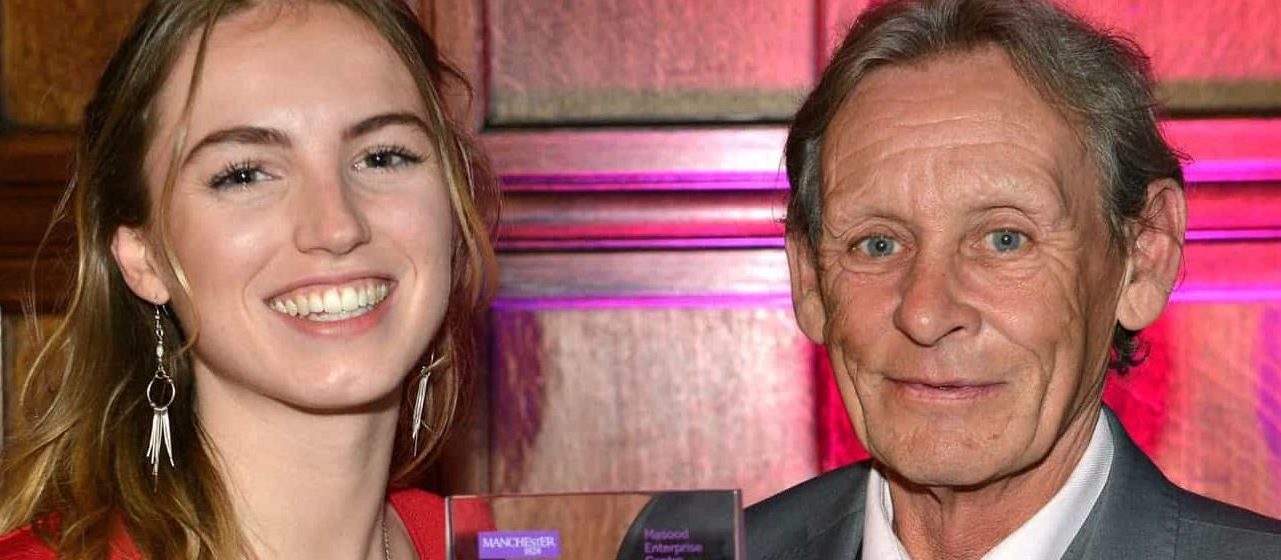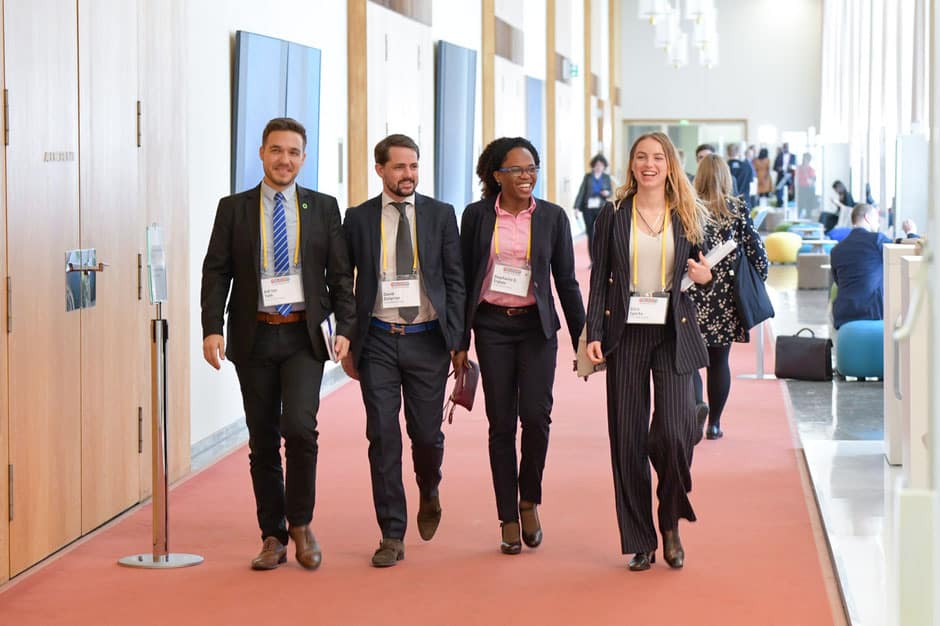
By Léonce Gamaï
Founded in October 2017 by a 21-year-old Briton, Invisible (Manchester) trains homeless people as tour guides and public speakers. The social enterprise of the Young Global Changer aims at having a global impact through local actions.
“The YGC program and the Global Solutions Summit have been one of the most exciting experiences of my life. I feel honored to have been selected to be part of such a prestigious program,” says Alice Sparks at the headquarters of the Friedrich Ebert Foundation in Berlin. Here Sparks participated in the 2019 edition of the Young Global Changers program.
Sparks says she is going home to Manchester, with “tremendous motivation and courage”, and that she really has the power to positively impact the world. “Everyone I met through YGC was amazing and I genuinely feel that collectively and in collaboration we have the ability to change the world for the better.”
With a degree in politics and modern history from the University of Manchester, the 21-year-old Briton is one of 90 young people in the Global Solutions Initiative’s (GSI) Young Global Changers 2019 cohort. Young Global Changers are students and professionals from various parts of the world and are active in their communities. They were selected from more than 3,000 applicants to participate in a two-part program: the three-day Summer School and free participation in the Global Solutions Summit, GSI’s annual conference that serves as a springboard for the G20 Leaders’ meeting in June.
The Young Global Changers program has three core objectives. It aims to provide participants with new skills, knowledge and networks that will enable them to create positive change in the world, mobilize them to interact with different stakeholders at the Summit, and then support them in the development of action ideas at the global level.
Sparks was selected for this competitive program thanks to Invisible (Manchester), her social enterprise founded in October 2017 after returning from a professional immersion in Rwanda with Challenges Worldwide. Invisible (Manchester) aims to raise public awareness of homelessness by breaking down the negative stereotypes of people living on the streets whilst simultaneously empowering people who have lived on the streets to have their voice heard. The first year was dedicated to fundraising, networking and establishing a relationship of trust with associations for the homeless; the company started its activities in October 2018.
“Our goal is to challenge stereotypes about homelessness, which are distant and dehumanized by many people. Homelessness destroys the self-esteem of people living on the streets as they become invisible in society, ” Sparks says. According to official statistics, as of January 2019, Manchester Metropolis, a city in England, there were 241 homeless people. Other figures published by the newspaper The Guardian in 2019 reveal that Manchester has recorded the highest death rate of homeless people.
Furthermore, according to a BBC News survey in 2017, 41 percent of respondents admit to being afraid of the homeless.

To help solve this problem, Invisible (Manchester) trains homeless people in the city as tour guides and speakers. “We provide support for every aspect of their lives. The tours create a unique atmosphere that allows guests to be more attentive to their surroundings. It’s special to see a group of 10 or 15 clients listen religiously and treat a homeless tour guide respectfully,” Sparks says.
Niches of opportunities
The size of Manchester’s tourism industry and the new trends in the sector makes the city a good place to operate Invisible tours. Citing an article in the Manchester Evening News in 2017, Sparks shares that the tourism sector of the Manchester metropolitan area attracts 119 million visitors a year, generating 7.9 billion euros and providing some 94,000 jobs. This makes Manchester the third largest tourist destination in the UK. As the city is home to two of Europe’s biggest football clubs, the tourism sector is expected to grow 25 percent by 2020. “As the tourism sector grows, tourists’ expectations are growing,” Sparks says.
Two growing trends have emerged among travelers: authentic tourism and sustainable tourism. Authentic tourism is when people are eager to interact with locals from the city they are visiting. Sustainable tourism is also expanding around the world. “The target audience of Invisible Manchester, homeless travel guides are conscious consumers, Sparks explains. These “travelers enjoy doing local activities that are personal and have an impact on the ground.”
Invisible (Manchester) has one fully-trained tour guide. He earns £20 with every tour. The social enterprise has five other guides in training and four volunteers. With this team, Invisible (Manchester) has had over 350 tour customers and an audience of over 1,000 people through presentations at conferences, schools and events. The resources generated are reinvested in the guides’ personal development and ongoing training or in social initiatives. In Edinburgh, the social enterprise finances a street barbers and a women’s pampering night. In Manchester, the program will help their guide realize one of his dreams: publishing a collection of poems.
Local action, global impact
Invisible (Manchester) is a branch of the initiative Invisible Cities. The idea was originally launched in 2016 in Edinburgh by Zakia Moulaoui, the first expansion to Manchester in 2017 was facilitated by Alice Sparks – and this is when Invisible Cities was established. The initiative has since expanded to Glasgow and York.
Invisible Cities is what is known as a glocal social enterprise, meaning the enterprise works locally to have a global impact. However, Invisible Cities can manage only small teams in the cities. “Five guides max per city because we want to focus on the quality of support provided and allow guides to be players in their communities,” Sparks says.
The needs of people who have been homeless can be complex explains the General Manager of Invisible (Manchester). This makes it a challenge to ensure the impact from this initiative are sustainable.
“We believe we can overcome these risks by providing a strong support network,” Sparks adds. In addition to providing opportunities for personal growth and personal development via high-quality, continuing training and support.
After five intense days at the Summer School and Global Solutions Summit, the Young Global Changer is coming home galvanized.
“I feel that my head is on the verge of explosion considering the amount of information I have absorbed, and fantastic people I encountered,” she says.
Spark’s is leaving the Young Global Changers program inspired by an exchange with one of the participants.
“I had an interesting conversation with one of the Japanese participants who mentioned that in Japan, there is a program that consists of organizing sessions in which (former) homeless people respond to public concerns,” Sparks shares.
This program in Japan, Sparks concludes, “gives the homeless a sense of utility to others in the community.” The young social entrepreneur thinks it could be integrated into the enterprise. She is already planning for a similar exchange between Invisible (Manchester) guides and the public.
In May 2019, the initiative won in the social category of the “Venture Further” startup competition run by Alliance Manchester Business School’s Masood Enterprise Center.
___
The views and opinions expressed in this article are those of the authors and do not necessarily reflect the views of the Global Solutions Initiative.
___
 Alice, is the Head of Invisible (Manchester) and a 2019 Young Global Changer. Invisible is a global social enterprise that trains people who have experienced homelessness to become walking tour guides of their city. The purpose is to give people a voice, when they haven’t had one before, putting them at the centre of the attention and challenging the stigmas that exist around homelessness.
Alice, is the Head of Invisible (Manchester) and a 2019 Young Global Changer. Invisible is a global social enterprise that trains people who have experienced homelessness to become walking tour guides of their city. The purpose is to give people a voice, when they haven’t had one before, putting them at the centre of the attention and challenging the stigmas that exist around homelessness.
 Léonce, a Young Global Changer of 2019.
Léonce, a Young Global Changer of 2019.
